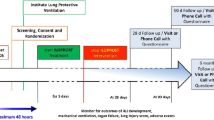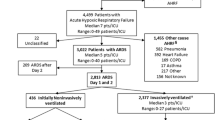Abstract
The inappropriate endogenous secretion of tumour necrosis factor (TNF) could play a role in the pathogenesis of acute respiratory distress syndrome (ARDS), one of the most frequent causes of death in cancer patients. Because of its capacity to inhibit TNF secretion in vitro, pentoxifylline (PTX) could be extremely useful in ARDS therapy. In this study 30 advanced cancer patients with ARDS were randomized to receive either the conventional care or conventional care plus PTX (100 mg i.v. twice a day for 7 days followed by an oral administration of 400 mg three times a day) to evaluate the efficacy of PTX in reducing TNF serum levels and in improving the symptoms of this syndrome. Serum levels of TNF were measured before and after 7 days of therapy. The percentage of patients alive at 7 days was significantly higher in the PTX-treated group than in the controls (12/15 versus 3/15; P<0.001). The mean survival time was significantly higher in the PTX-treated group than in the controls. A clinical and/or radiological improvement was obtained in 11/15 patients treated with PTX and in only 2/15 patients in the conventional care group (P<0.01). TNF mean levels significantly decrease in the PTX-treated group. These data confirm in vivo the capacity of PTX to inhibit TNF secretion in patients with ARDS. Moreover PTX therapy may improve the symptoms related to ARDS without particular toxic effects.
Similar content being viewed by others
References
Ardizzoia A, Lissoni P, Brivio F, et al (1992) Tumor necrosis factor in solid tumors: increased blood levels in the metastatic disease. J Biol Regul Homeost Agents 6:103–107
Bernard GR, Luce JM, Sprung CL, et al (1987) High-dose corticosteroids in patients with adult respiratory distress syndrome. N Engl J Med 317:1565–1570
Heyers TM (1981) Pathogenesis of adult respiratory distress syndrome: current concepts. Semin Respir Med 1:104–109
Hudson LD (1982) Adult respiratory distress syndrome. Semin Respir Med 2:99–105
Lissoni P, De Toma D, et al (1992) Pentoxyfylline in the treatment of respiratory distress syndrome in advanced cancer patients. Acta Oncol 13:192–194
Millar AB, Foley NM, Singer M, et al (1990) Tumor necrosis factor in bronchopulmonary secretions of patients with adult respiratory distress syndrome. Lancet I:712–716
Stephens KE, Ishizaka A, Larrick JW, Raffin TA (1988) Tumor necrosis factor causes increased pulmonary permeability and edema. Am Rev Respir Dis 137:1364–1370
Strieter RM, Remick DG, Ward PA (1988) Cellular and molecular regulation of tumor necrosis factor alpha production by pentoxyfylline. Biochem Biophys Res Commun 155:1230–1236
Tracey KJ, Lowry SF, Cerami A (1988) Cachectin/TNF in septic shock and septic adult respiratory distress syndrome. Am Rev Respir Dis 137:1377–1399
Ward A, Clissold SP (1987) Pentoxyfylline: a review of its pharmacodynamic and pharmacokinetic properties, and its therapeutic efficacy. Drugs 34:50–97
Ziegler EJ (1988) Tumor necrosis factor in humans. Lancet I:1533–1534
Author information
Authors and Affiliations
Rights and permissions
About this article
Cite this article
Ardizzoia, A., Lissoni, P., Tancini, G. et al. Respiratory distress syndrome in patients with advanced cancer treated with pentoxifylline: a randomized study. Support Care Cancer 1, 331–333 (1993). https://doi.org/10.1007/BF00364972
Issue Date:
DOI: https://doi.org/10.1007/BF00364972




